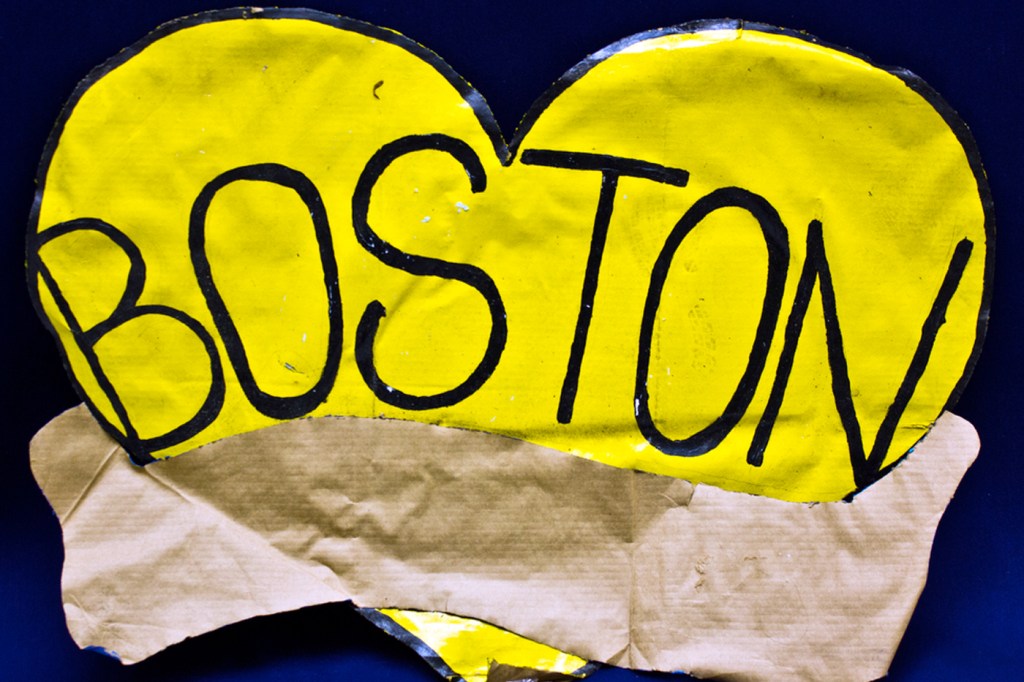Five years after attack, Boston Marathon digital archivists find healing in storytelling

Five years on, revisiting the digital archive created after the Boston Marathon bombing is still part of the healing process for those who curated it.
“It feels like you’re touching a wound,” said Elizabeth Maddock Dillon, one of the archive’s primary investigators. “It’s painful. While there are a lot of wonderful stories that came out of that event—stories of people helping each other, of first responders saving lives—you can still feel that visceral experience of shock, pain, grieving, and loss that people encountered.”
Dillon, along with many others, sprang into action after the bombing on April 15, 2013 that killed three and injured hundreds more. An English professor at Northeastern, she was part of a team of students and faculty who collected and preserved the stories of that day and everything that followed in a project called “Our Marathon: The Boston Bombing Digital Archive.”
It was grueling work, both physically and emotionally. The archivists canvased the streets and attended related events to spread word of the project and invite the community to contribute to the thousands of stories, photos, videos, oral histories, social media, and other materials in the collection.

“It was one of the most intense projects I’ve ever worked on; it took over my whole life for a few months,” said Ryan Cordell, assistant professor of English and another of the archive’s primary investigators.
“I’ve never been involved in anything that’s moved quite so quickly,” he said. “Mostly I study people who lived 150 years ago, so there’s not the same kind of urgency.”
The Northeastern group forged partnerships across the university and the city at large—collaborating with WBUR, the Boston City Archives collection, The Boston Globe, and WCVB, among others—to tell the full story of the Boston Marathon bombing.
Of course, part of that story includes this work, by these researchers.
“It’s hard to believe it’s been five years, looking at this stuff,” said James McGrath, MA’05, PhD’15, a former Northeastern doctoral student and the project’s co-director. “It was such an intense experience at the time—you had your historian hat on, but you’re still a resident of Boston.”
McGrath, who is now a postdoctoral fellow at Brown University, reflected on the project with five years’ vantage. “The work is really important, but really difficult,” he said, then paused. “I’m glad we did it; it’s one of the most important things I’ve done in my career.”
The archive, too, is an important healing tool both for those who built it and those who contributed to it.
It was such an intense experience at the time—you had your historian hat on, but you’re still a resident of Boston.
James McGrath, PhD’15, a former Northeastern doctoral student and the project’s co-director
Alicia Peaker, PhD’14, was a doctoral student at Northeastern and the project’s co-director. Now living in Philadelphia and working as the digital scholarship specialist at Bryn Mawr College, she said she feels the distance both physically and emotionally. “I’m in a community now where folks don’t share those memories from that day,” she said. “Returning to the archive is a way of healing.”
Indeed, healing was an important aspect of the archive itself. Sharing stories, memories, posters, candles, anything, is a lightening of the individual load, a communal experience.
“Our motto while we were working on the archive was that there’s no story too small,” Peaker said. “The archive isn’t just a product or a final endpoint but a way of processing—a way to connect to other people, to work through their own trauma and thoughts. It’s a digital archive that folks can return to again and again.”

That emphasis on story is part of what makes this digital archive unique. In addition to the collaboration that made it possible, the archive was conceived of and created by researchers in the humanities—by English scholars.
“We think a lot about how stories matter, about who’s telling stories, and who’s listening,” Dillon said. “We have a grounded interest in storytelling that inherently connected with this community event. Our guiding idea is in the title of the archive: ‘Our Marathon.’ It’s a collective storytelling, and in that sense it provides a snapshot of a community that is rich and textured.”
The digital archive was recently transferred to the university’s digital repository so others could see and utilize the resources, a healing process in and of itself, Cordell said.
“That’s been an interesting transition to think through,” he said. “It’s new to think about this as a historical event rather than a contemporary event that people are actively reflecting upon.”
Our guiding idea is in the title of the archive: ‘Our Marathon.’ It’s a collective storytelling, and in that sense it provides a snapshot of a community that is rich and textured.
Elizabeth Maddock Dillon, English professor, one of the archive’s primary investigators
Five years after the Boston Marathon bombing, a lot has changed. The memorial in Copley Square has been tucked away. A new crop of runners will toe the starting line this Monday. The blue and yellow #BostonStrong signs, once ubiquitous, are harder to spot throughout the year.
It’s not that the memories, the trauma, the signs of support are gone—they’ve just changed shape though the intervening years. Perhaps the edges have softened, the colors have faded, or the stories have taken on a new context. Perhaps not.
Their significance has not waned, though—in fact, the Our Marathon digital archive ensures that anyone who still needs to process the events of that fateful day has a place to do so. Likewise, historians of the future will have access to the sights, sounds, and stories of a tragedy that impacted so many.
For more information on the digital archive contact co-director Ryan Cordell at r.cordell@northeastern.edu or at 617-373-4540; co-director Elizabeth Maddock Dillon at e.dillon@northeastern.edu or at 617-373-8577; or visit https://marathon.library.northeastern.edu/




